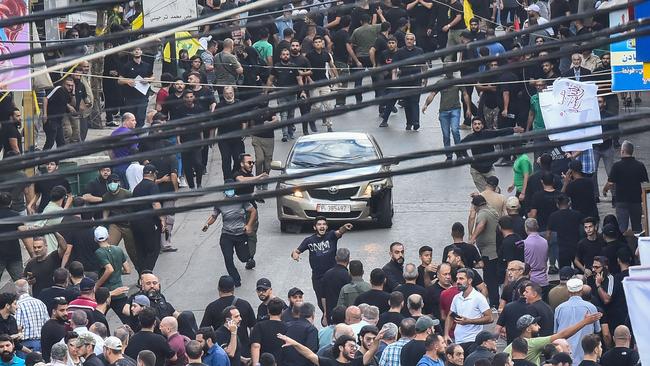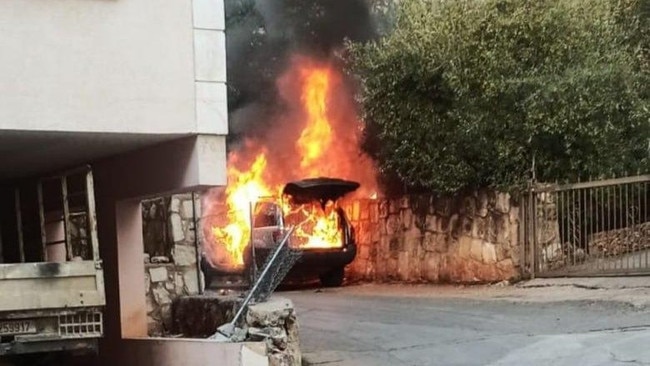Hezbollah orders urgent investigation into device fires
The massive security breach has sown chaos and fear, paralysing militant ranks.

Hezbollah leadership has ordered an urgent investigation into the massive security breach to calm chaos and fear that has paralysed the militants’ ranks.
The shock of Tuesday’s astounding attack as thousands of pagers exploded in a direct targeting of more than 3000 of Hezbollah’s commanders was followed by mass panic when a second wave of blasts was triggered by manipulated walkie-talkies. The two days of blasts killed scores of people and injured thousands.
Hezbollah issued an urgent alert on its social media channels for its 100,000 militants to check all mobile and electronic devices “to make sure they are not captured”, and to “disconnect the batteries of any wireless technology device”.
Beirut locals are pondering “Will the fridge be next?” as neighbourhoods rip out batteries and unplug the internet connections.
Their anxiety about Israel’s aggression has switched from concern of being on the frontline to whether their home is safe. Two large solar panel systems and recently installed electronic devices such as fingerprint scanners were also damaged in Beirut on Wednesday, adding to a sense of paranoia, locals say.
Hezbollah fighters have been directly targeted through the tampering of a large batch of thousands of pagers and walkie-talkies ordered by the Hezbollah leadership months ago amid fears their mobile phones were being tracked.
But Hezbollah is still trying to assess just where the massive security breach occurred: through an Israeli front company or an inexplicable delay at Customs? Or did a team of undercover Mossad agents drive the truck transporting the goods, allowing a switch of product or direct tampering?
Security analysts say while the pagers would have been technologically easy to booby-trap with small amounts of explosive, setting off the walkie-talkies would have been more difficult because of the need to know the frequency. However, using a drone, or an undercover Mossad agent among the crowds, or perhaps tinkering with the emergency button at source may be how the larger handheld devices were turned into bombs, it has been suggested.
It is also unclear if the solar panels and other electronic systems were “collateral damage” because they were tuned in to the same frequency as the walkie-talkies.
The Lebanese Civil Defence said it had to extinguish 60 fires across the country that started when the walkie-talkies exploded. A source close to Hezbollah said walkie-talkies used by its members blew up in its Beirut stronghold, with state media reporting similar blasts in south and east Lebanon.
Many of Hezbollah’s supplies come through established Iran-based links and the manufacturing plant of the paging and walkie-talkie devices has not yet been uncovered, suggesting infiltration may have occurred on the production line.

The Taiwanese-branded pagers were outsourced to a shadowy Hungarian company, BAC Consulting, whose Russian- and Italian-speaking chief executive, Cristiana Barsony-Arcidiacono, studied disaster management in London. She told a US TV station: “ I don’t make the pagers. I am just the intermediate. I think you got it wrong.” The Hungarian government has denied the equipment was made in Hungary.
Lebanon’s communications ministry said the walkie-talkies involved in the explosions were a discontinued model, IC-V82, labelled as being from Japanese firm Icom. The devices were not supplied by a recognised agent, were not officially licensed and had not been vetted by the security services, the ministry said.
Icom said it had stopped manufacturing that model a decade ago. The company said it had strict export controls with authorised distributors. “The IC-V82 is a handheld radio that was produced and exported, including to the Middle East, from 2004 to October 2014. It was discontinued about 10 years ago, and since then it has not been shipped from our company,” Icom said. “The production of the batteries needed to operate the main unit has also been discontinued, and a hologram seal to distinguish counterfeit products was not attached, so it is not possible to confirm whether the product shipped from our company.”
And it’s not just Hezbollah that wants to know. Taiwanese Defence Minister Wellington Koo said Taipei was closely watching developments. “The relevant national security bodies are paying great attention to this,” he said.
In Japan, chief cabinet secretary Yoshimasa Hayashi said: “We are closely monitoring and currently gathering information.’’
The mystery of just how the low-tech products became mini bombs, continues.




To join the conversation, please log in. Don't have an account? Register
Join the conversation, you are commenting as Logout